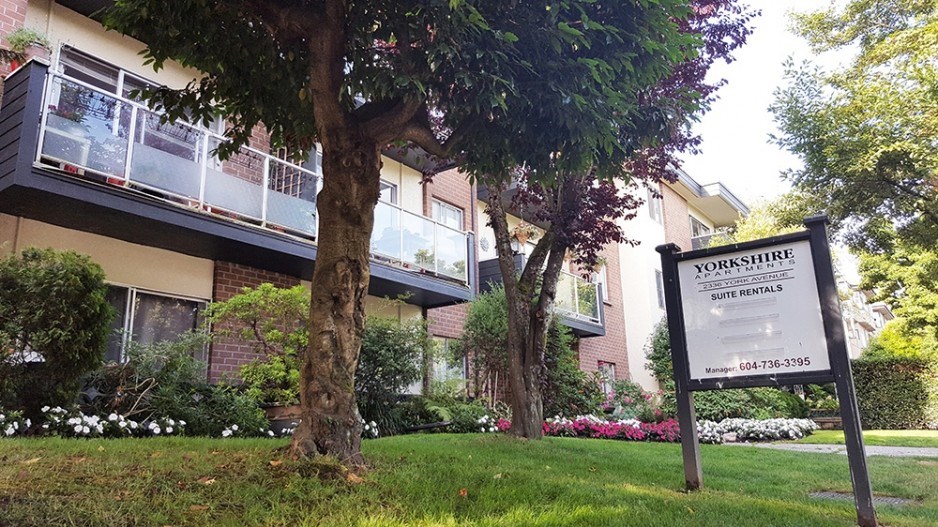Instead of enjoying the tail end of another Vancouver summer, the residents of 2336 York Ave are scouring the city’s scant rental vacancy listings for a new place to live before October.
They’re the latest to face a wave of “renovictions” sweeping the city, a term applied to the practice of landlords removing tenants due to planned renovations, then bumping up the price of rent when the work is complete, often by a large amount.
The letters appeared in the mailboxes of Lauren Stanley and her fellow residents at the end of July: 60-day termination notices from owner Peter Wall Mansion & Estates so that extensive renovations could take place through the whole building. When the work was completed, rent would be raised by at least $700 per unit.
“I teared up a little bit,” Stanley says, recalling her reaction. “I’ve called the place home for the last three years,” she adds, saying the 630-square-foot, one-bedroom apartment been the only place she’s lived in Vancouver since she moved from Kelowna.
“It’s not only that, it’s the process of moving – there’s money involved with that – there’s trying to find a place, there’s trying to find a decent building manager, because the one we have at the moment is a sweetheart,” adds Stanley, who currently pays $1,340 a month and is facing an increase of more than 50 per cent. “It kind of shocks you when you’re not expecting that.”
The situation is presumably even more daunting for one of her neighbours, who Stanley says has lived in the block for 29 years – and faces her rent rising to $3,000 per month.
Renovictions aren’t new, but no precise figures exist on the practice and how common it is, with only a selection of stories from across the city describing its often debilitating effects on tenants.
There are tales, too, of unscrupulous landlords ending tenancies due to promised extensive renovations, then doing little more than a paint job before jacking up the rent by 40 or 50 per cent. Tenants forced out have little recourse for justice because the burden of proving any wrongdoing lies with them.
Tenant advocates say the law – namely, the Residential Tenancy Act – has swung too much in favour of landlords.
“Historically whenever the rental market is tight, what we are seeing with tenancy is that landlords tend to be not as cognisant of their obligations under the act. They get sloppy. They have the power,” says Lorna Armstrong of the Tenant Resource & Advisory Centre.
She says the root of the problem lies in the vacate clause, which has become almost standard in fixed one-year rentals.
At the end of the year, a new agreement must be negotiated, which allows landlords to get around maximum allowable annual increases in rent – in 2017, that’s 3.7 per cent – and inflate it by vastly greater amounts.
With rental units at a premium, most tenants are happy to check the box beside the vacate clause, or are unaware of its implications.
“Vacate clauses have synthetically raised rates for years well above market value,” Armstrong says.
This, in turn, Armstrong says, leads to landlords of long-term tenants realizing they are earning much less from rent than comparable units with inflated prices; and a renoviction is one way to bring them up to par.
“The vacate clause has raised rents so tremendously that landlords without one want to get on the greed wagon, so they evict everyone so they can get these higher rates,” Armstrong says.
Stanley is one of a group of York Avenue residents that has lodged a dispute with B.C.’s Residential Tenancy Branch. Under relocation guidelines introduced by the city in February 2016, their landlord must assist them with finding new accommodation while the renovations take place, but no details have been forthcoming.
It means they face the prospect of finding at least temporary accommodation in a city that recorded a rental vacancy rate of 0.7 per cent in 2016, according to the Canada Mortgage and Housing Corporation.
The York Avenue tenants have been offered one month’s rent in compensation by Peter Wall Mansion & Estates, as well as a moving allowance ranging from $500 to $750.
Armstrong says those facing renoviction have 15 days to challenge the notice. She advises following up with the landlord about the nature of the renovation: It should be significantly disruptive – knocking down walls, replacing plumbing or electrical, etc. – to warrant the removal of the tenant. In this case, the landlord must have permits for the work, which should have been issued before the notices were sent to tenants.
TRAC would like to see cities impose a moratorium on permits unless they’re for health, code or fire regulation reasons, as well as more compensation and notice for tenants receiving notice.
Armstrong also wants to see B.C.’s new NDP government step up and tackle the issue as it promised during the election campaign.
“We are very concerned by these type of evictions, particularly at a time when there is a supply-and-demand issue in the province,” said minister of municipal affairs and housing Selina Robinson in an emailed statement. “… It is clear that the law does not sufficiently protect tenants in these situations.
“We are planning to close loopholes and ensure tenants are better protected. We also want to ensure landlords understand their responsibilities in these situations.
“We know that not enough has been done to protect tenants and, over the months ahead, we will be taking more action to deliver on our commitments to renters in B.C.”
Calls to Darcee Wise, Peter Wall’s property manager for 2336 York Ave., were not returned before press deadline.




